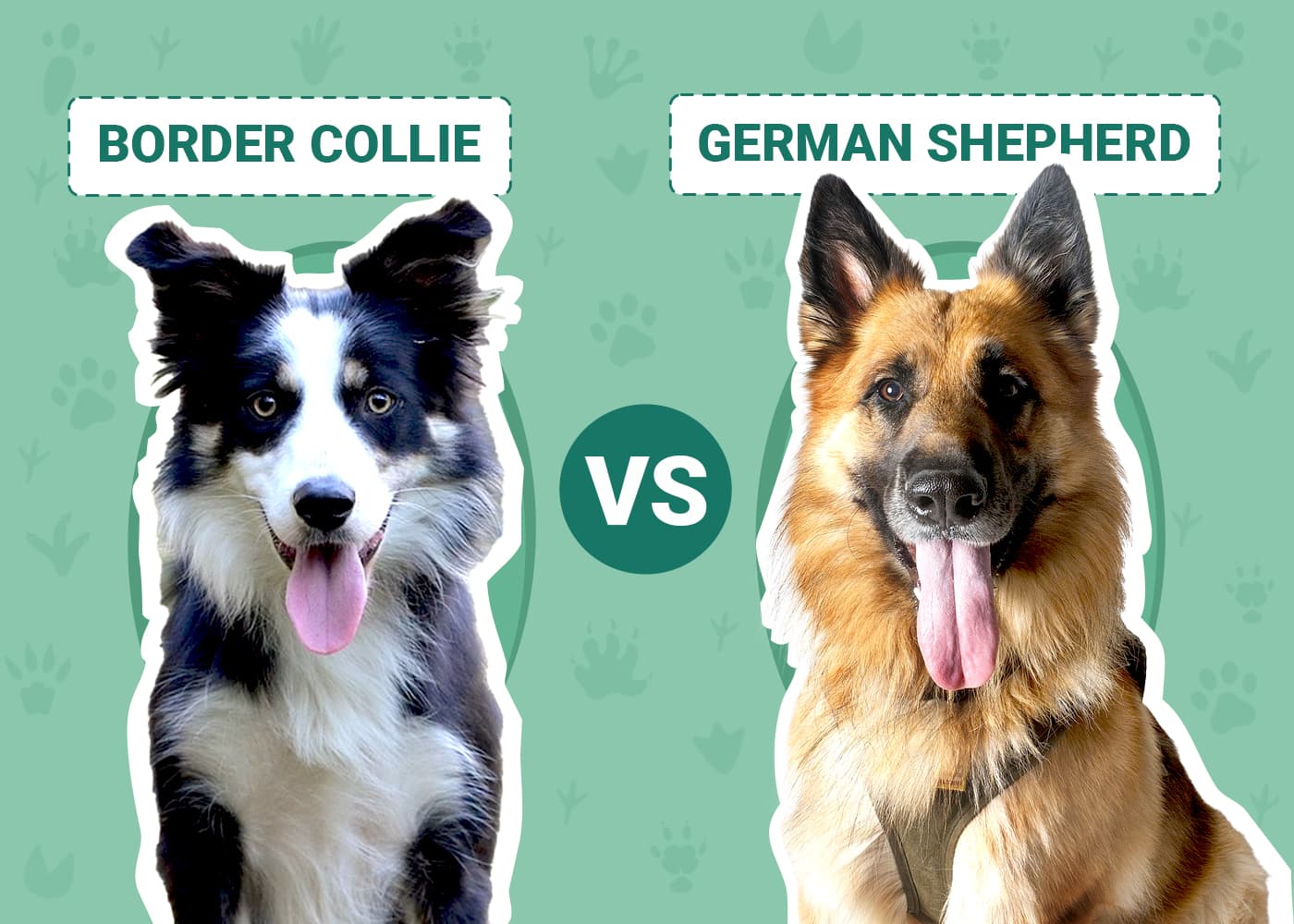Click to Skip Ahead
When selecting a dog, many people consider Border Collies and German Shepherds due to their popularity and unique traits. As you will soon learn, they do share a lot of similarities. But they also have several differences that make each breed distinct.
Today, we’ll be examining these differences so that you can better determine which breed is the best fit for your lifestyle and preferences. Get ready to learn more about these intelligent, loyal, and hard-working breeds!
Visual Differences
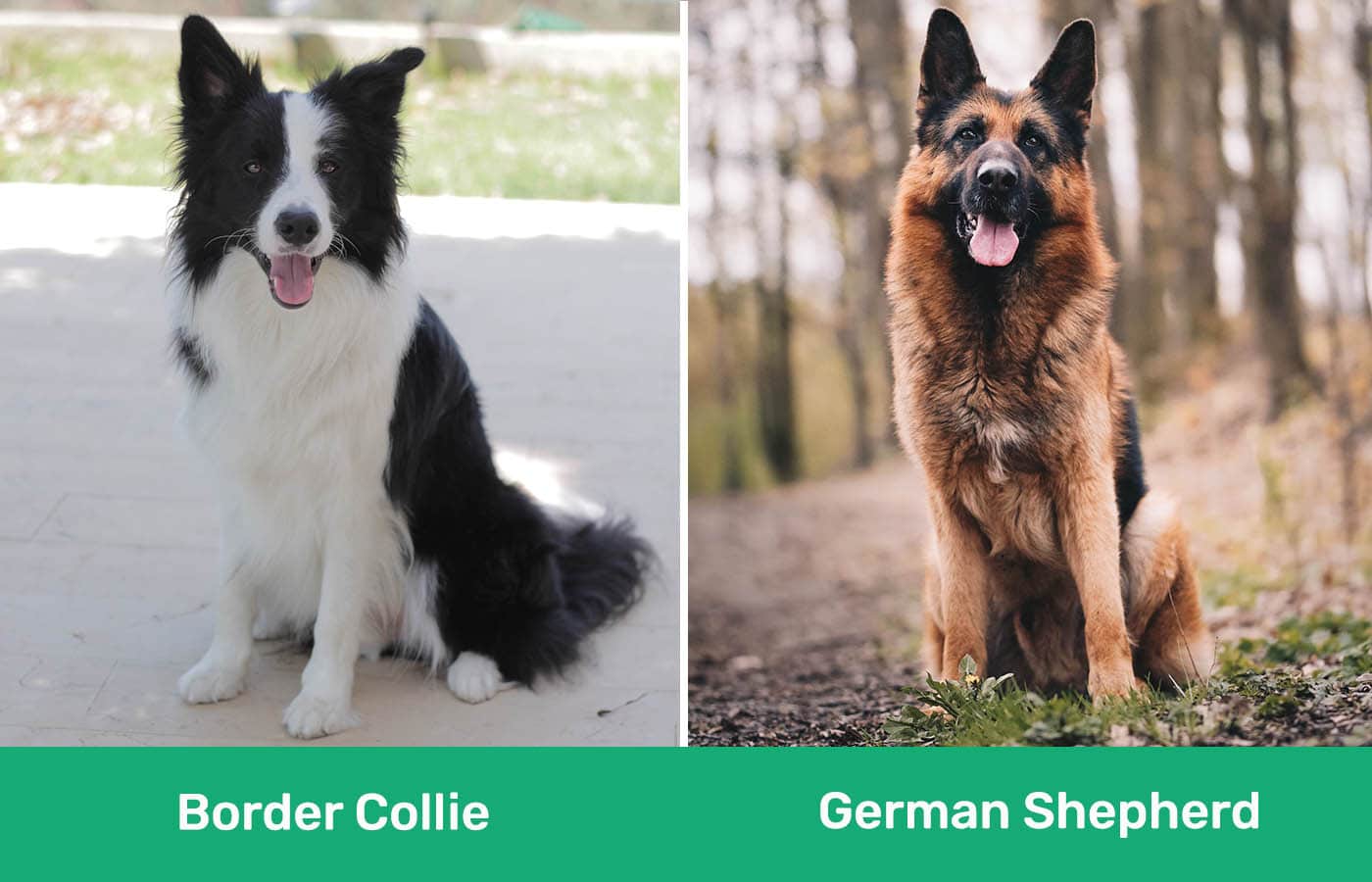
At a Glance
- Average height (adult): 18–22 inches
- Average weight (adult): 30–45 pounds
- Lifespan: 12–15 years
- Exercise: 2+ hours a day
- Grooming needs: Moderate
- Family-friendly: Yes
- Other pet-friendly: Often
- Trainability: Highly trainable, smart, independent
- Average height (adult): 22–26 inches
- Average weight (adult): 50–90 pounds
- Lifespan: 9–13 years
- Exercise: 2+ hours a day
- Grooming needs: Moderate
- Family-friendly: Yes
- Other pet-friendly: Often
- Trainability: Highly trainable, eager to please, loyal, stubborn
Border Collie Overview
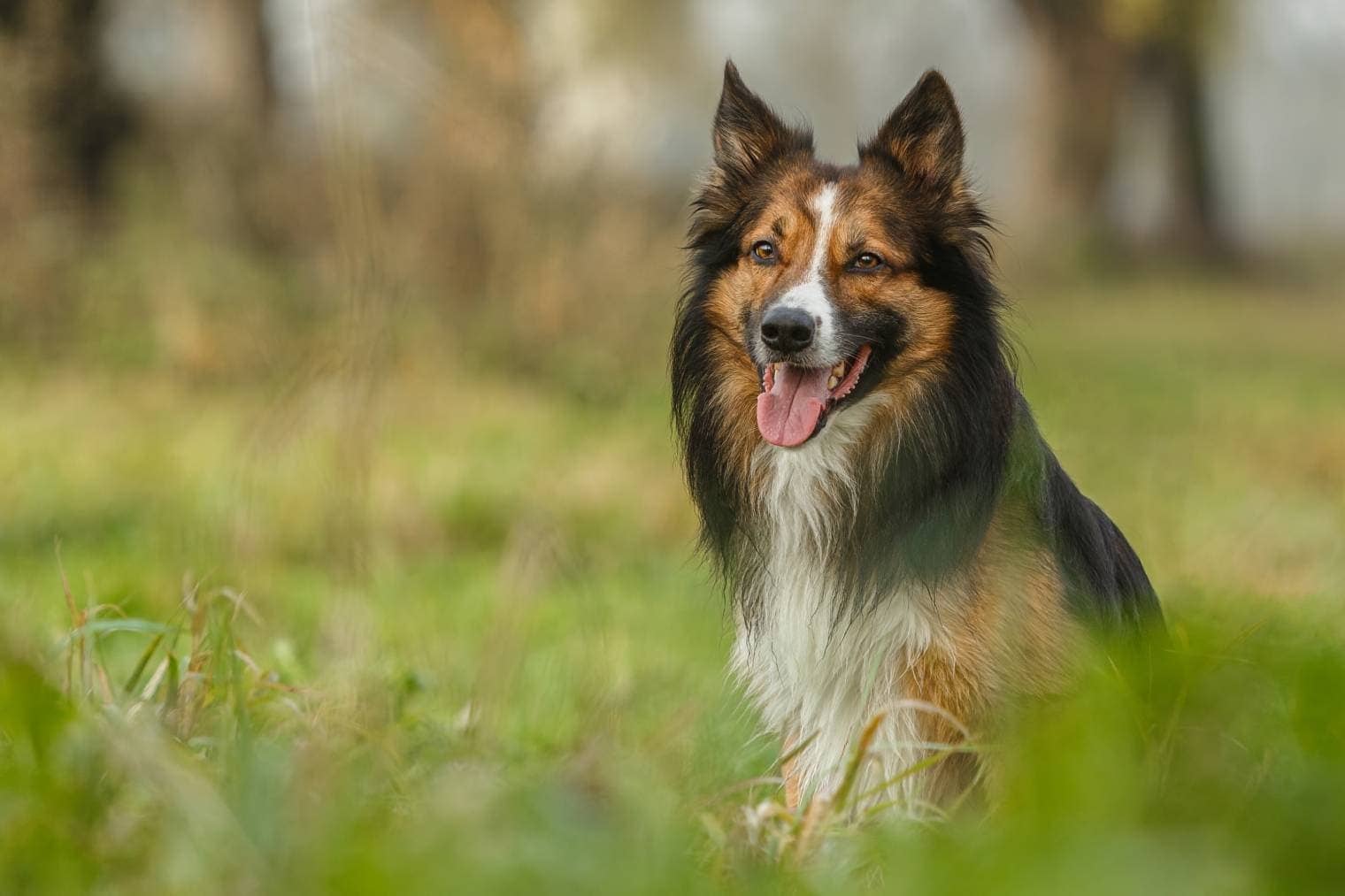
Border Collies are known for their intelligence, high energy, and friendly disposition. Bred for herding livestock, they are incredibly hard-working dogs that excel at various tasks and dog sports. Thanks to a strong work ethic and eagerness to please, Border Collies form strong bonds with their owners and can be very affectionate.
Exercise
Border Collies possess a remarkable amount of energy and stamina, which necessitates daily physical activities to keep them in good shape and mentally satisfied. Engaging them in activities such as running, off-leash play, and interactive games like tug-of-war can help channel their energy in a positive direction.
Involvement in canine sports, like scent work or herding trials, can further contribute to their overall physical and mental well-being.
Socialization
Fostering positive social experiences is vital for Border Collies to grow into well-adjusted and self-assured dogs. Gradually exposing them to various people, places, and situations at an early age will help them become more adaptable and relaxed in unfamiliar environments.
Proper socialization can also minimize the likelihood of anxiety or timidness, creating a friendly and outgoing companion. To enhance socialization opportunities, consider taking your Border Collie to community events and dog-friendly establishments or enrolling them in doggy daycare where they can interact with other canines.
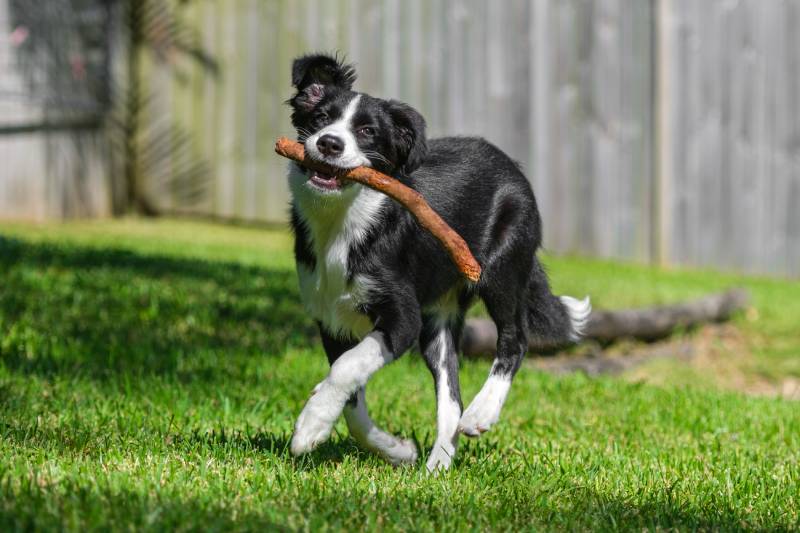
Training
Border Collies are incredibly receptive to training and take great pleasure in learning new tricks and commands. To avert potential behavioral issues, it is crucial to provide early socialization and maintain consistency in their training.
These dogs thrive in activities such as obedience, agility, and herding trials, which not only showcase their skills but also offer mental stimulation.
Health & Care
While generally a healthy breed, Border Collies may be susceptible to certain health concerns, including hip dysplasia, progressive retinal atrophy, collie eye anomaly, and epilepsy. To ensure their well-being, it is vital to provide regular exercise and a nutritious diet. Routine veterinary check-ups and genetic testing can help monitor and manage potential health risks.
Grooming & Maintenance
Border Collies typically have medium to long double coats, necessitating regular brushing to avoid matting and reduce shedding. Some need to be brushed up to eight times a week. Their grooming routine should also include nail trimming, ear cleaning, and dental care to promote overall health and cleanliness.

Suitable For:
Border Collies make ideal companions for active families, seasoned dog owners, or those who relish outdoor pursuits and can allocate time to training and exercise. These energetic dogs flourish in environments where they are physically and mentally engaged, making them suitable for working roles or as family pets for those with an active lifestyle.
However, their high exercise and training demands may not be the best fit for first-time dog owners or those with more sedentary routines. Moreover, many Border Collies struggle with small kids around. Without proper socialization early on, this could be a problem for families with little ones.
- Highly intelligent and trainable
- Affectionate and loyal
- Good with children and other pets
- High energy, requiring regular exercise
- Can develop behavioral issues if not properly stimulated
German Shepherd Overview
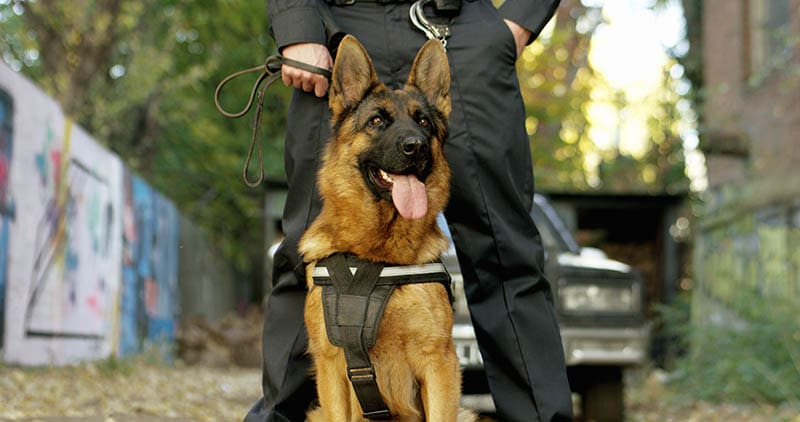
German Shepherds are known for their loyalty, courage, and versatility. Often used as police, military, and service dogs, they are highly intelligent and protective of their family. They can be aloof with strangers but form strong bonds with their owners.
Exercise
German Shepherds require regular exercise and mental stimulation to stay happy and healthy. Long walks, hikes, and engaging playtime are ideal ways to keep them active and content. These dogs also excel in various dog sports like agility, tracking, and obedience trials, which can provide additional physical and mental challenges.
Socialization
Socializing your German Shepherd from an early age is essential to ensure they grow up to be well-rounded and confident dogs. Exposure to different people, animals, and environments will help them become more adaptable and accepting of new situations.
This is especially important given their protective nature, as proper socialization can help prevent overprotective or aggressive behaviors.
Training
German Shepherds are eager learners but can be stubborn at times. Early socialization and consistent training are crucial to ensure they become well-behaved and obedient companions. Utilizing positive reinforcement techniques and providing structure can help motivate them and make the training process more enjoyable for both you and your dog.
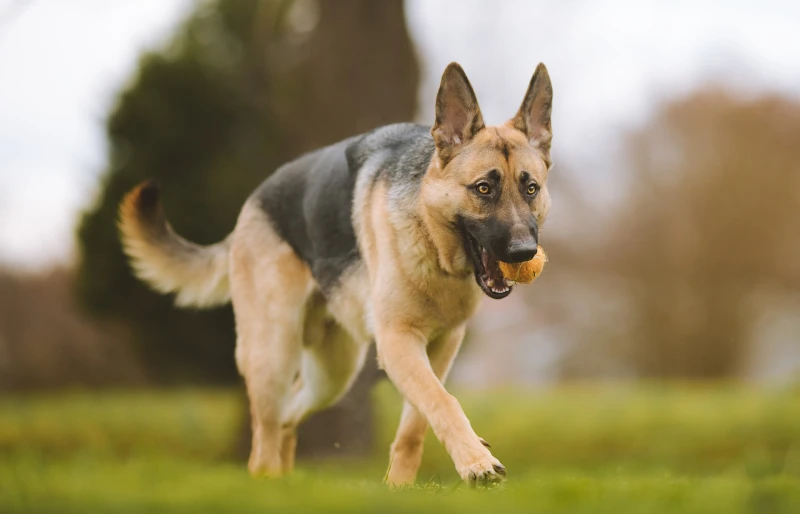
Health & Care
If you’re considering a German Shepherd, it’s important to know that they’re susceptible to specific health issues, such as hip and elbow dysplasia, degenerative myelopathy, and bloat.
To ensure the health and safety of your pooch, you will need to schedule regular check-ups with a vet, feed them a balanced diet, and make sure they get daily exercise. You can also take preventive measures by maintaining a healthy weight, providing joint supplements, and avoiding activities that can strain their joints unnecessarily.
Grooming & Maintenance
German Shepherds have a double coat that sheds seasonally, requiring regular brushing at least four times a week to keep their coat healthy and reduce shedding. They should also receive regular nail trims, ear cleanings, and dental care to maintain their health and hygiene.
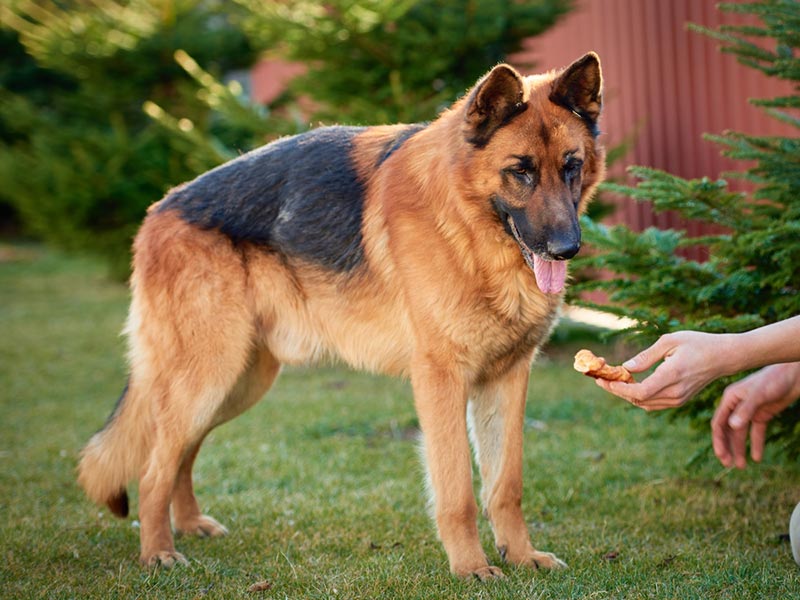
Suitable For:
German Shepherds are best suited for active families, experienced dog owners, or those seeking a loyal and protective companion. Their adaptability, intelligence, and protective nature make them an excellent choice for various roles, including working as service dogs, search and rescue dogs, or simply as a devoted family pet.
But as with Border Collies, the high energy levels and training requirements of German Shepherds mean they may not be the best fit for first-time dog owners or those who are less active.
- Intelligent and versatile
- Protective
- Excellent family dog
- Can be stubborn during training
- Prone to specific health issues
Which Breed Is Right for You?
Ultimately, choosing between a Border Collie and a German Shepherd comes down to your personal preferences, lifestyle, and the specific traits you are looking for in a canine companion. Both breeds are intelligent and loyal and make excellent pets, but they have different temperaments, exercise needs, and grooming requirements.
If you are looking for a highly trainable, affectionate, and energetic dog that excels in various activities, a Border Collie may be the perfect choice. However, if you prefer a more protective and versatile breed that can adapt to different roles, a German Shepherd might be a better fit.
Take your time to research both breeds and consider factors such as your living situation, time commitment, and experience with dogs before making a decision. Whichever breed you choose, you are sure to have a loyal and loving companion by your side.
Featured Image Credit: (T) Chung Nguyen, Unsplash | (B) Shumilov Ludmila, Unsplash

